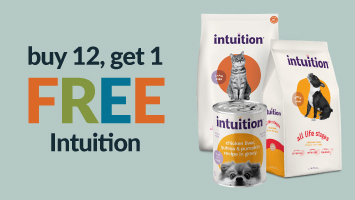Product details
Ketoconazole is an azole antifungal used to treat a wide range of fungal infections in animals.
This product is a tablet formulation.
-
Used to treat a variety of susceptible systemic fungal infections in dogs and cats.
-
At low doses, ketoconazole can also be used to reduce the dosage requirements (and cost) of cyclosporine.
-
Do not administer to breeding, pregnant, or nursing animals. Pregnant individuals should avoid handling this medication if possible; if handling is necessary, wear gloves and exercise extreme caution.
-
May be prescribed for other animal species; please consult your veterinarian.
-
While this drug does not have an FDA-approved indication for all animal uses, it is commonly accepted for veterinarians to prescribe this medication for use in animals.
*Please note: This is a generic medication. Product packaging and appearance, including size, color, and shape, may differ from the description or images provided and are subject to manufacturer availability.
Product sourced directly from the manufacturer or their approved distributor. Guaranteed genuine product backed by the manufacturer.
For
Dogs and Cats
Active ingredient(s)
Ketoconazole
Common brand names
Nizoral
Drug class
Azole antifungal
Product strength & size
This product contains 200 mg of ketoconazole in each tablet. Please ensure the selected product and package size are appropriate for your pet, as recommended by your veterinarian.
For current availability, please refer to the product selection above.
Usage
Ketoconazole Tablets should be given orally as directed by your veterinarian. Please consult your veterinarian before making any changes or discontinuing the prescribed dosing schedule.
This medication should be given with food to enhance absorption and help prevent or reduce gastrointestinal side effects. High-fat foods (e.g., cheese, butter, cream cheese) may be ideal for enhancing absorption. Consult your veterinarian for the best way to administer this medication according to your pet’s individual diet and treatment plan.
If you are pregnant or planning to become pregnant, avoid handling this medication if possible. If handling is necessary, wear gloves and exercise extreme caution during handling and administration. All pet owners should wash their hands thoroughly with soap and water after handling (even if gloves are worn).
If your pet is taking this medication to treat an infection:
Your pet may require several weeks (or even months) to complete the full treatment course; do NOT skip or miss any doses.
Administer the complete course of the medication as prescribed, even if your pet's condition has improved. Failure to administer the entire course of treatment may cause recurrence or worsening of the infection. Contact your veterinarian ahead of time if your pet needs a refill.
Missed doses
Administer the dose as soon as possible. If it is almost time for the next dose, skip the missed dose and continue with the regular schedule. Do not give two doses at once.
Storage
Store in a cool, dry place at a controlled room temperature (68 to 77°F, brief excursions permitted between 59 and 86°F). Keep in a tight, light-resistant container and out of the reach of children and pets. Store away from heat and direct sunlight. Do not store in the bathroom, near the kitchen sink, or in damp places. The medicine may break down if exposed to heat or moisture.
Side effects
The most common side effects of this medication are vomiting, diarrhea, and decreased appetite.
A reversible lightening of the haircoat/fur color has been documented in some animals treated with this medication.
Contact your veterinarian immediately if your pet has severe vomiting, complete loss of appetite, extreme weakness or decreased energy level, cloudy eyes, or if you notice yellowing of the skin, whites of the eyes, and/or gums.
Notify your veterinarian if your pet experiences any of the effects described above, or if you notice any other side effects that are persistent or troublesome.
If you notice anything unusual, please consult your veterinarian.
Precautions
Do NOT administer this medication to breeding, pregnant, or nursing animals, or those with acute or chronic liver disease.
Pregnant individuals should avoid handling this medication if possible; if handling is necessary, wear gloves and exercise extreme caution.
Use with caution in cats and animals with thrombocytopenia (low platelet counts), hypoadrenocorticism (Addison’s disease), or that are undergoing stressful events (e.g., surgery, trauma, serious illness).
Do not administer to animals with a known history or suspected allergy/hypersensitivity to any azole antifungal, including this medication or any of its ingredients. Allergic reactions to medications may occur. Be sure to inform Vetsource and your veterinarian if your pet has any known drug sensitivities or allergies.
If your pet displays symptoms of an allergic reaction, discontinue therapy and call your veterinarian immediately or seek emergency veterinary attention. Symptoms may include (but are not limited to): swollen lips, tongue, face, or airways; difficulty breathing; agitation; profuse salivation; and widespread hives or itching.
Drug and food interactions
The following drugs* may have potential interactions with this medication: antacids (containing aluminum, calcium, and/or magnesium), concurrent azole antifungals (e.g., fluconazole, itraconazole), benzodiazepines (e.g., alprazolam, diazepam), calcium channel blockers (e.g., amlodipine, diltiazem), corticosteroids (e.g., dexamethasone, prednisone), cyclosporine, dexmedetomidine, digoxin, estriol (Incurin), fluoroquinolone antibiotics (e.g., ciprofloxacin), H2-receptor antagonists (e.g., famotidine), hydroxyzine, ivermectin, maropitant (Cerenia), metronidazole, mirtazapine, NSAIDs, ondansetron, opioids, phenobarbital, phenothiazines (e.g., acepromazine), praziquantel, proton pump inhibitors (e.g., omeprazole), rivaroxaban, sildenafil, sotalol, SSRIs (e.g., fluoxetine, sertraline), sucralfate, toceranib (Palladia), tramadol, trazodone, tricyclic antidepressants (e.g., amitriptyline, clomipramine), and warfarin.
*NOTE: this may not be a comprehensive list. Contact your veterinarian if your pet experiences any unusual reactions when different medications are given together.
Please ensure your veterinarian is aware of all medications and supplements that your pet is currently receiving. Your veterinarian may prescribe multiple medications, even if a potential drug interaction may occur. In these instances, your veterinarian may adjust the dosages or monitor your pet more closely.
Adverse reactions
If you are concerned that your pet has experienced an adverse reaction to this medication, please contact Vetsource Pet Owner Care at 877-738-4443.
Overdose
If you have any reason to suspect an overdose, call your doctor/veterinarian or the appropriate poison control resource immediately.
For humans:
The national toll-free Poison Help line, 1-800-222-1222, will connect you to your local poison center in case of emergency. This service is available nationwide and in most U.S. territories.
For animals:
The ASPCA Animal Poison Control Center is available 24 hours a day, 365 days a year at 888-426-4435.
Pet Poison Helpline® also provides a 24/7 animal poison control service at 855-764-7661.
*Please note: this information is for third-party services and is provided for convenience in case of potential poison-related emergencies. There may be consultation fee for these services.
Disclaimer
The content provided on this page is NOT medical advice.
All content, including the images and product description above, is intended for general informational purposes only and should not be considered a substitute for professional veterinary consultation, diagnosis, or treatment.
Consult your veterinarian for complete information about this product and how it fits into your pet's individual treatment plan.
Last revised: 7/08/2025












